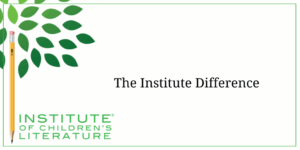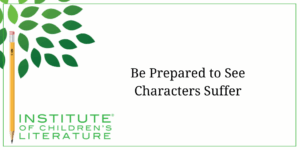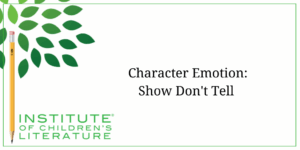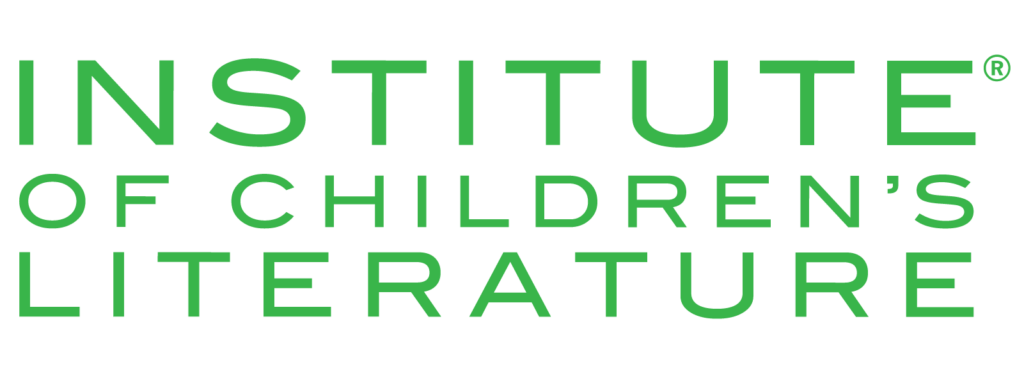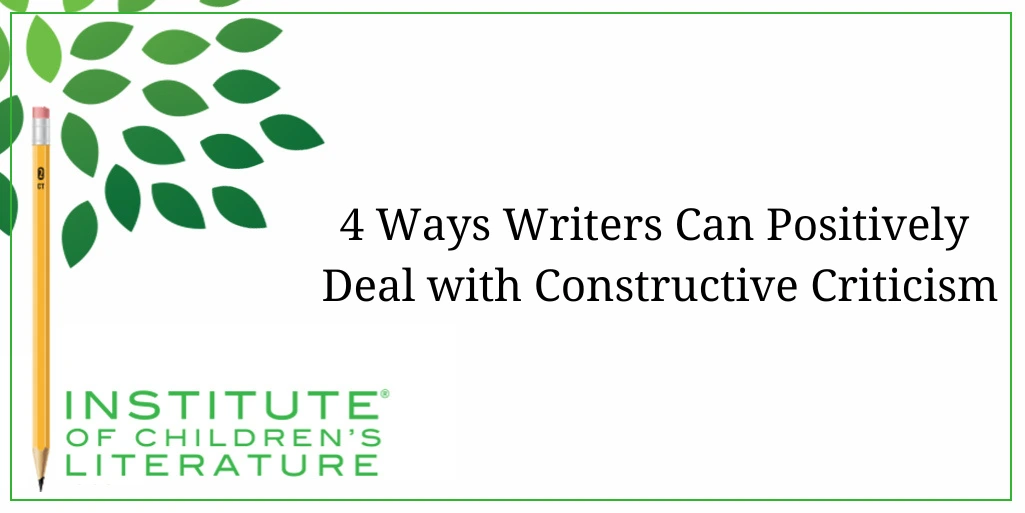
- Date: December 19, 2024
- Author: Jan Fields
- Category: Writing for Children Blog
- Tags: Critique, motivation, Revision
We teach our students how to write and get published!
View our Course Catalog >
4 Ways Writers Can Positively Deal with Constructive Criticism
Creatives can be thin-skinned. We love what we do, and we invest a lot of ourselves in the work we create. As a result, criticism of our work can feel like criticism of ourselves. And the more personal the work, the more this is true. But a thin skin can make it difficult to grow, improve, and learn, because thin skins are sensitive and easily hurt. And people in pain don't tend to be terribly receptive.
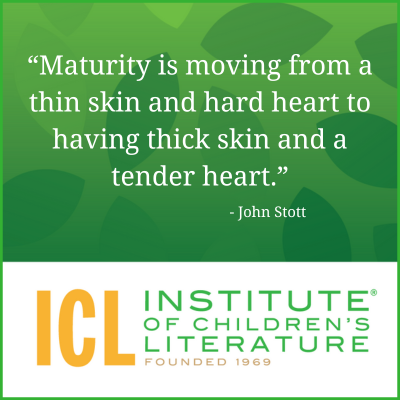 What’s a creative to do?
What’s a creative to do?
How do we get a thicker skin? Is that even something you can do? Is it even desirable? Maybe what we need isn't a thickening, but an understanding. In this post, let's consider some helpful ways to navigate the process of being a writer, even when it hurts.
Some things are always going to hurt. Rejection hurts. Really ugly reviews hurt. Lack of support from family and friends hurt. And writing tends to run us up against those things, sometimes over and over.
The result can be automatically protective reactions to all critiques. It's understandable. But sometimes it's a problem, such as when someone is trying to give you helpful feedback. Getting better means improving skills. Improving means facing that are areas where improvement is needed. And that requires being open.
So how do you stay open to constructive criticism, even when your natural reaction is retreat and defensiveness? Here are four tips.
1. Give Yourself Time to Recover.
One of the best ways to deal with constructive criticism is to give yourself time before responding. Let yourself ride out the defensiveness and urge to retreat. Slap a gag order on yourself but promise the raging inner defender that it's only temporary. Tell yourself that you will react and stomp and even throw cushions, but not right now. Not in the middle of your critique group. Not when reading critique from a writing instructor. Not when getting editorial notes from your publisher. Reaction is for private time.
 I still give myself time to react to criticism. I'm not thick-skinned. I hate hearing that I failed at something in my most recent book. And my immediate reaction tends to be something like, “No, I didn't, and you're a great big stupid-head.” But that wouldn't help build my professional relationships. And in a critique group, that won't help build friendships either. And it's not going to help me produce better writing.
I still give myself time to react to criticism. I'm not thick-skinned. I hate hearing that I failed at something in my most recent book. And my immediate reaction tends to be something like, “No, I didn't, and you're a great big stupid-head.” But that wouldn't help build my professional relationships. And in a critique group, that won't help build friendships either. And it's not going to help me produce better writing.
It is an attitude that doesn't let me be objective. Still, I find it useful if I do give myself a little inner rant time. I let the frustration and defensiveness out, just not onto the people giving the critique. They don't deserve my temper tantrums. They're trying to help. So I suppress that immediate reaction. I don't respond to ugly reviews. I don't yell at editors. And I definitely don't rant at innocent critique partners. I do that later when there are no innocent victims. I let it out. Because then I can make space to be more objective and realistic.
It's very difficult for me (personally) to be properly objective before I am done being ranty. So, in critique sessions, I take careful notes and play the part of a reasonable sensible adult. I thank people for their constructive criticism. I thank editors and promise to spend time with editorial notes. I don't thank the folks writing ugly book reviews. They are on their own. And maybe, just once in a while, I kind of hope they step in dog poop. But I keep that quiet. Cause that's just me. I have issues.
2. Remind Yourself That Your Work Isn't You.
One of the hardest parts of accepting constructive criticism is feeling personally attacked. Writing is a very personal activity. I've put years into learning to do it well. Plus, it's something I love doing. So it's really easy to take the critique of something I've written as a critique of me. It's not a critique of me. Editors aren't hating on me. Even the folks writing ugly reviews aren't actually critiquing me personally. They have their own issues. And possibly some dog poop on their shoes.
Still, separating my work from myself is a tough job, and you really can only do it in increments. I have to constantly remind myself that my work isn't me. Making a mistake doesn't make me a failure. That misunderstanding an editorial direction doesn't make me stupid or a bad writer. Even producing bad writing doesn't make me bad—it doesn't even make me a bad writer.
All writers craft things that don't work. That's one of the reasons why critique is so valuable. It's hard sometimes to tell that what you've written is bad until someone points it out. Sometimes you don't know the emperor isn't wearing clothes until someone points and laughs. I need the critique and the editorial feedback. I need it because I don't want to put bad work into the world. So I tell myself over and over that it isn't me the critique is about, it's merely something I've produced. (And I do increasingly believe it.)
3. Develop a Medicine Attitude.
We've all been to the doctor or the dentist or have taken medicine that tastes disgusting. It’s not pleasant. Sometimes, it’s downright painful. And, if we're honest, sometimes we put it off longer than we should. Eventually, we step up and do what we need to do because we understand these things are necessary. They are part of getting or staying well.
 For the writer, critique is a kind of medicine. Sometimes it's not too bad. Not tasty, of course, but not too bad. But sometimes it's awful. It's the worst, and it's all we can do not to gag from it. But those are the times when the medicine tends to be for something really wrong. If it really is wrong, the cure can be very uncomfortable, but you still need it.
For the writer, critique is a kind of medicine. Sometimes it's not too bad. Not tasty, of course, but not too bad. But sometimes it's awful. It's the worst, and it's all we can do not to gag from it. But those are the times when the medicine tends to be for something really wrong. If it really is wrong, the cure can be very uncomfortable, but you still need it.
That's something I remind myself of over and over and over. I need constructive criticism. I can read writing books (and I do). I can watch writing videos or podcasts. I can attend writing workshops. And I can apply things I learn in these ways. These things make me better. But nothing makes me better faster than when someone points out exactly where something isn't working in a piece I've written. I need people to point out my bad writing habits. I need people to tell me when a joke I made in my writing doesn't land. I need people to show me if a character's growth and change isn't believable. I need to be told when I'm rushing the pace. I need this feedback because without it, I'll keep doing those things. And I’ll keep wondering why I get bad reviews or rejection letters.
Quite frankly, rejection is far more unpleasant than facing some uncomfortable critiques. A critique helps me fix the problem before I trot it out in public. The editorial feedback I receive keeps me from putting out a bad book. The input of critique partners helps me avoid sending out manuscripts that stand no chance of acceptance.
4. See Constructive Criticism as Mining, Not Warfare.
Here's a little fact about critique. It's not always right. Sometimes editors point to something, and they're not right. Not often, but definitely sometimes. Sometimes critique partners point out something or make a suggestion and they're wrong. This is slightly more frequent than when dealing with professional editors, but still not a constant occurrence. Still, all critique isn't correct. You don't have to accept it all. You don't have to implement it all. But if you're smart, want to grow as a writer, and want success, you need to pay attention to all feedback.
Critiques aren't something someone is doing to you. They aren't insults. This isn't warfare. They are actually gifts. But not all gifts fit. And not all gifts are your style. My mom loved me to pieces. But her taste in clothes was not my taste in clothes. And she tended to give me gifts that suited her, not me. But the gift was given in love. And sometimes, she hit it spot on and gave me something perfect. So if I just rejected every package or tossed it into the closet, I'd have missed out on some wonderful things. And, quite frankly, I would have been disrespecting a gift and a giver.
 I was always hoping for a gem among the things Mom picked. And I'm always mining for gems amongst critique input as well. Not everything will fit my style or my story. But sometimes a critique points me toward something I really need to look at again, and I find a gem that way—a bit of story I can make better and more effective. And sometimes (actually often), critiques are spot on, and I need to make changes where the critiquer pointed out the problem.
I was always hoping for a gem among the things Mom picked. And I'm always mining for gems amongst critique input as well. Not everything will fit my style or my story. But sometimes a critique points me toward something I really need to look at again, and I find a gem that way—a bit of story I can make better and more effective. And sometimes (actually often), critiques are spot on, and I need to make changes where the critiquer pointed out the problem.
Sometimes helpful critique partners will offer alternate ways of saying what I said. Sometimes they do that so I can better understand what they are trying to say. And sometimes they do it because they really think it would be better that way. These suggestions rarely fit quite right, but with a little trimming and accessorizing, sometimes they're perfect.
Keep in mind that just because a critique contains something you cannot use doesn't mean everything about it is useless and you should ignore it all. Most critiques are pointing you to real problems you need to think about. Every critique is the result of a reader hitting something that didn't work for them. So, you need to look at it and see if you can tell why it didn't work and whether you need to change it.
Not every reader will get every moment. Sometimes making a story work for just that one reader won't improve the story for others and will actually weaken it. But as much as possible, I want my stories to be clear, to flow, and to work for as many readers as possible. So I have to pay attention. Even if it isn't easy.
Mining is a difficult occupation. It can leave you sore. You can smash your fingers and get dirt in your eyes, which stings. But it is the only way to find the rough gems you want more than anything. So, when you're given a constructive criticism, accept that it can sting. In fact, it can flat out hurt. But you can get through it and you can learn from it. And even if your skin doesn't get any thicker, your writing will get better. And for most of us, that's worth a little pain now and then.
Related Articles for Accepting Constructive Criticism
With over 100 books in publication, Jan Fields writes both chapter books for children and mystery novels for adults. She’s also known for a variety of experiences teaching writing, from one session SCBWI events to lengthier Highlights Foundation workshops to these blog posts for the Institute of Children’s Literature. As a former ICL instructor, Jan enjoys equipping writers for success in whatever way she can.

